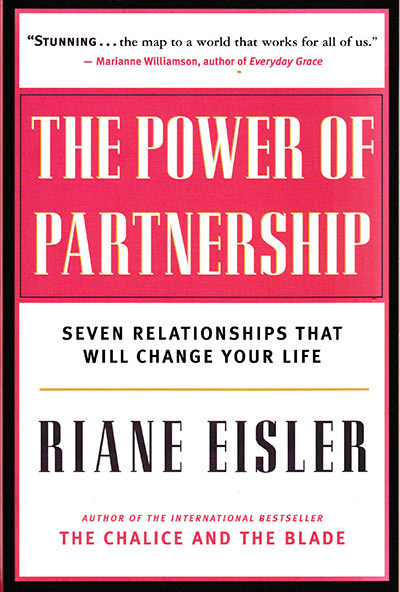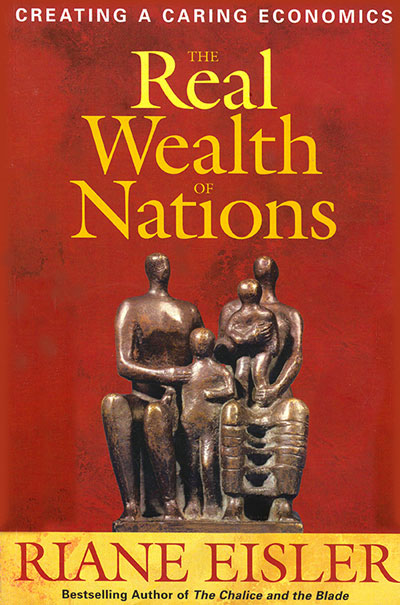
Global warming is melting our polar ice, threatening our coasts. Pollution fills our seas, our air, and our food. Creatures of the Earth are being squeezed out by ever more people, who are themselves unable to meet their needs for water and other natural resources. Our relationship with nature is terribly out of balance.
From Mother Earth to Biotechnology
Those who fight environmental regulations claim that all that is needed to solve our problems is increased production and consumption. But in truth, environmental problems are actually the result of these kinds of “solutions.”
Through technology and industrialization we have changed the face of our planet, and caused devastating environmental crisis. But the problem is not industrialization itself. There is no intrinsic reason that industrial technologies have to exploit and pollute our environment. With progress toward a partnership orientation have come laws to protect our environment and industrial processes that avoid waste and pollution.
The problem is the domination culture in which they were developed. Overconsumption is inherent to dominator societies where consumption is a symbol of power and control is a substitute for emotional and spiritual fulfillment. If we believe the dominator ethos of “man’s conquest of nature,” we will likely do irreparable harm. If we seek partnership and harmony with nature, technology could vastly improve our lives.
Population
Economic Rules
What We Can Do to Protect Nature and Ourselves

Here are some things you can do to help change our course — to protect nature and ourselves.
At Home
- Obtain a list of environmentally and socially responsible companies from Co-Op America and buy from them.
- Support CPS in its continuing efforts to spread partnership worldwide.
- Recycle and reuse when possible.
- Buy biodegradable soaps and pesticide-free produce.
- Use nontoxic methods of pest and weed control.
- Use energy-efficient light bulbs and drive a car that has fewer emissions and better gas mileage.
- Call phone-in talk shows and counter the lack of information in the media.
- Write blogs and editorials for the mainstream press.
- Vote for government officials who support funding for family planning both at home and abroad.
- Work to get those who oppose this funding out of office.
- Invest in stock from socially and environmentally responsible businesses.
At School
- Support Partnership Education that includes environmental education.
- Ask your school district to use natural gas, or better still, electric school buses.
At Work
- Adopt manufacturing methods to recycle materials and avoid waste.
- Join environmentally responsible professional and business organizations such as the Social Venture Network and the World Business Academy.
- Encourage your workplace to conserve energy and water.
- Encourage your workplace to use recycled paper products.
In the Community
- Lobby for government regulations that protect our environment.
- Join groups such as Planned Parenthood International, Population Action International, Population Connection, the Pathfinder Fund, and the Population Institute that provide family planning technologies.
- Write legislators to support the United Nations Population Fund (UNFPA), which mounted a massive educational campaign that links overpopulation with environmental and human rights issues.
- Join environmental organizations, for example, the Union of Concerned Scientists, the Sierra Club, and the Earth Island Institute.
We urgently need cultural values that support partnership rather than domination — that teach us that we are part of a miraculous web of life interconnected with our Mother Earth. We need to strengthen partnership values and leave behind the old programming of conquest and control that has kept us from moving to more balanced and harmonious relations with ourselves, with others, and with Nature.

Additional Resources
Brief Clip - Riane Eisler at the Washington D.C. 2007 Green Festival
Articles & Reading
- Riane Eisler?s 2011 Address to the UN General Assembly on Harmony with Nature
- Desertification and World Security
- Keynote at 2013 U.S. Ecological Economics Conference: ?Building a Caring Economy: Moving Past Rhetoric Towards Realizing a Just Distribution?
- The Real Wealth of Nations: Creating a Caring Economics

A Hidden Truth About Climate Change: Excerpts from Riane Eisler?s 2009 UN Address
But there?s more that needs to be considered. Studies show that women are 14 times more likely to die in natural disasters. For instance, a heart-rending study of a Bangladesh flash flood found that 90 percent of casualties were female. And a big reason for this was a culture of domination. To begin with, a woman?s role in this Southeast Asian nation, as in most of the Middle East and parts of Africa, is not to be independent — so these Bangladeshi women were not taught to swim. But perhaps the most important factor was that they lived and died in a culture where women are so rigidly controlled that they aren?t permitted to leave their homes without being accompanied by a male family member. So when the flash flood occurred, they complied with this mandate — and drowned.
Another important hidden truth comes from studies showing that when women become involved in disaster-response planning and training there are far fewer casualties — not only of women, but of children and the elderly. One study even found no casualties when women engaged in disaster-response preparedness.
It?s incumbent upon us to bring this information to the attention of U.N. as well as national government officials. We should also insist that In contributing funds for disaster training and response, the U.S. should allocate a sizable portion to women?s organizations so our monies are used more effectively and equitably. We must also use environmental conferences to bring attention to egregious human-rights violations (Forbidding women to leave their home alone is a form of house arrest!). We can also help the U.N. carry through on its promise to institute gender architecture mainstreaming. This will promote equal partnership between men and women, and show that when we speak of democracy and human rights, we mean it.

